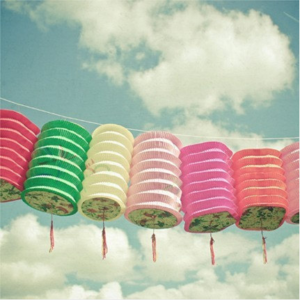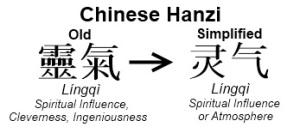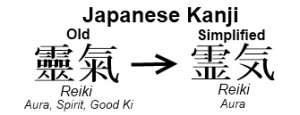Guestblogger Paul Selk and I have corresponded over the past year and I’ve appreciated his informed perspective on Japanese language, culture and history. Paul supported Colin Powell’s recent guest blogs on the translation of the Reiki kanji, and here he offers more perspective on how much is lost when we translate Asian culture and language into American English. —
Is Reiki practice spooky?
Having read several times about the issue of using the original kanji in Japan — that they don’t even use the simplified ka nji to write Reiki, due to rei being spooky — I wanted to find out how the Chinese felt about the old hanzi (Chinese equivalent of kanji), to see if the same spooky feeling was there.
nji to write Reiki, due to rei being spooky — I wanted to find out how the Chinese felt about the old hanzi (Chinese equivalent of kanji), to see if the same spooky feeling was there.
I sought the help of some Chinese friends, immigrants who know English pretty well, but still have some trouble with it. Tony is in his 30s and Wei is in her 50s.
I thought it would be an interesting experiment, since Chinese people have the same psycholinguistic processing as Japanese people and for the most part use the same pictograms. Neither of my friends know anything about Reiki practice, so that wouldn’t influence their responses.
When I showed them the old and new hanzi for ling (rei), they nodded and said, “Oh, ling.” I asked, “These two hanzi mean the same thing, but do you feel anything different with them?”
Kanji that are translated the same, actually have different meanings
Tony looked at the paper and said, “They translate same, but not mean same.”
I questioned him to make sure I understood this point correctly, and he was quite clear that although the old and new hanzi are translated into English the same, the old and new hanzi have different meanings to Chinese people.
He pointed to the new hanzi and said, “This is for smart people.” Wei said the other hanzi is “for old people.”
In order to explain (for lack of words in English), Wei described the types of people who still use the old hanzi by acting them out. She rolled her eyes up, eyelids fluttering, held her hands out like a zombie and started talking about spirits coming and telling her what to do, walking around the restaurant like Frankenstein. It was very humorous.
Wei got serious when she mentioned the palm reader, and said, “She look at your finger, and she tell you, ‘you have lucky day,’ or she look at your finger and say to you, ‘you going to be sick.’ Then she say, ‘that will be 50 dollar,’ but you no get nothing from her. You save your money!” Wei said that the old people who use that hanzi talk about spirits.
By this time I was laughing, but I stopped when Tony said the old hanzi for ling was “bad.” Tony explained that the old hanzi has this negative connotation because it is connected to people who believe in ghosts.
What it came down to is that with the old hanzi there is a feeling of superstition. By “smart people,” they meant people who are rational, who don’t believe in superstitions.
I did mention practicing Reiki to my Japanese neighbor once. She looked at me cautiously and seemed to move back a little, so I haven’t mentioned it to her again.
Do you speak Japanese? If so, please leave a comment, especially if you are a native speaker.
Chinese Lanterns print by Cassia Beck.
____________________
Please join my email list to receive credible Reiki information and perspective!

Hello Pamela-san and Kerry,
Ryoho is used like therapy at least in modern Japanese society. For example, aroma ryoho, chiropractic ryoho.
I hope it would help. Ryoho does not mean to Legitamize, at all.
Yuko
Thank you, Yuko, for the explanation of ryoho.
Hello, Pamela & Paul, and all those who have posted very interesting comments here. On the classic Japanese connotation of the “rei” kanji in Reiki, I have had a thought about the term “ryoho” that was apparently in the final line of the Precepts document, and the only time Usui Sensei had used it. I have stumbled upon an interesting translation for “ryoho”, which is “appropriate”. In light of the spookiness of “reiki”, perhaps “Reiki Ryoho” was meant to literally mean “appropriate spiritual energy”. “Appropriate” being a term that may have legitimised the spiritual nature of Reiki healing in Usui Sensei’s time…. Just a thought. Would love to hear any views on this term ryoho from your Japanese-speaking visitors here. Many thanks for the interesting article!
Kerrie, where did you find that translation for “ryoho?”
Why do you think there was a need to legitimize spiritual practice in Japanese culture in Usui’s time? Westerners may feel the need to do so now, but I’m not so sure that was a concern in Japan 90 years ago.
You might be interested to read my conversation with Japanese Reiki masters Hyakuten Inamoto and Hiroshi Doi. As I recall, they mentioned that Usui did not refer to Reiki as energy. It’s difficult to translate into English a concept that doesn’t exist in our culture.
Hello, Pamela. I’m sorry I know this was an old posting on your site that I have only recently discovered. I was simply commenting on the discussion here of the kanji for “rei” having the connotation of “spooky”, as in ghosts, etc, as opposed to its more modern use today. I have found “ryoho” translated through shiatsu sources as the term “appropriate”, which of course has a more profound meaning in Japanese culture where everything must be performed correctly and honourably. I find it interesting that Usui Sensei chose to write “Usui Reiki Ryoho” at the end of his Precepts. It has been suggested by Bronwen and Frans Stiene that this was the only place where it was recorded by Mikao Usui. During his time perhaps there was still some superstition around the kanji for “rei”, and adding “ryoho” may have been a qualification of the terms “rei”+”ki”. A modernisation, perhaps? I’m not an expert in Japanese language, but just throwing an idea out there. Thank you for your response!
No worries, Kerrie. I always ask for sources because there is so much misinformation passed along in the Reiki community without critical examination or noting whether something is a documented fact, opinion, or gossip. I do not find the authors you mention to be rigorous in their research.
Apologies: I think it was Dave King who made the remark that “Usui Reiki Ryoho” was only written at one time by Usui-Sensei, after the Precepts.
Pamela, I’m glad you wrote about the nonduality of reiki. One thing about reiki I appreciate is that it can “do no harm.” I always feel I’m in safe hands with reiki!
Sorry, I mis-typed… What I meant is GO-GYOH-SETSU.
Yuko(^^;)
Yuko,
All I meant is that whatever Reiki is, it is a subtler reality than is ki, or any subforms of ki.
Thank you so much for making the effort to share your detailed perspective on this.
Hello again and again,
I was right I have to get rid of the WIND, because it is called GO-AHEAD YOH-SETSU (FIVE).
Thank you.
Yuko
Hello again,
I was forgetting to list WIND in the “additional” KI.
Thank you.
Yuko
Pamela-san,
Thank you for your response.
REI and KI are different. That is why we use the different KANJIs. But yes. Pamela-san, REI and KI are the same. That is all we can say at least in English. REI is a kind of KI. We have soooooooooo many kinds of KI including REI, eg) as Paul-san mentioned JAKI is also KI which brings you illness. But we rather understand Jaki as a kind of REI. (So in English it is the same as you say, Pamela-san. It is KI.) In this case I use REI as bad KI.If you would ask me what kind of REI is, I would say JA-KI.
We have good REI, but in the modern society of Japan, REI is used as bad spirit or bad KI, bad dead spirit which is called SHI-RYOU or bad live spirit which is called IKI-RYOU.( IKI-RYO is mostly scared in Shintou-izm or Buddhism. )
But actually the idea is wrong as in Buddhism or in Shintou-izm, REI means good REI and bad REI. If you have opportunity to watch KABUKI, or NIHON-BUYOU it would be easier for you to understand. There are bad REI and good REI.
I had watched KABUKI and NIHON-BUYOU so many times when I was a kid with an OSSHOSAN. She used to translate the old lines in modern Japanese and explainning who those characters are.
And my great grand father who was a Shintou priest used to manage the (good and bad) Rei. I do not want to use such a word, manage, but that was only a word which I could manage in my English vocabulary. (Sorry, Hii-ojii-chan.)
So I am pretty sure on REI. And those KABUKI’s ideas and Shintou-izm’s and Buddhism’s are the same on REI….
*In KABUKI or NIHON-BUYOU or any other traditional art, SENSEI is called OSSHO-SAN, in Kyoto where I live we call OSSHO-HAN. We never call them SENSEI…)
So probably I understand what you mean, Pamela-san . I am not sure if you would agree with me or with what we have been doing traditionally with KI in Shintou-izm or Buddhism.[We say SHIN- BUTSU ITTAI. If I translate it in English directly, it means SHINTOU GODs and Buddhism gods (we call it HOTOKE-SAN in Japanese, we have many HOTOKE-SAN in Japan, but I do not know how do you call them in English. Maybe Buddha…? ) ]
So in SHINTOU-IZM and BUDDHISM basically what we do is the same. Just in case, Japanese BUDDHISM and Chinese BUDDHISM are differernt.
Pamela-san, what do you mean by KI is only the surface.
I have never done that kind of explanation on KI at least in Japanese, so I cannot imagine what you mean or cannot grasp the image of that. Or do you mean we have so many kinds of KI-ENERGY, like I as I told you above and plus in China they say we have additional energy( I am not sure if this is a propper explanation,”additional”.), tree, water, soil, fire, and gold? Or totally differernt… ?
I would appreciate if you would explain what it means.
Thank you, Pamela-san.
Thank you for reading.
Yuko
P.S.
It might take long time for me to answer next time, as I am having hard time with Ehlers-Danlos syndrome and Marfan syndrome now. Very bad today…
Sadly conventional medicine does not help at all… I am just paying money to the University hospital… In my case, SEIKOTSU or Chiropractics and physiotherapy helps…
Is physiotherapy a conventional medicine…? Maybe?
I find it really interesting that the word “spooky” is specifically used regarding the use of Rei because I have recently been fascinated by the parallels between Reiki and Quantum Physics and one of the theories that to me is extremely similar to Distance Reiki is called “quantum entanglement”, which Einstein called “spooky action at a distance.”
Thank you , Rose :)
Peter, I agree, there is a ‘feeling’ in the kanji that is very difficult for westerners to grasp. This is one of the aspects that Yuko-san mentioned in another post. When the official list of everyday kanji was made (the Toyo list), the other part of that change was that any old kanji not on the list was not to be used, but replaced by hiragana, which has about as much of that feeling as our letters. It essentially stripped half the culture out of their writing. When I was young I came across another riddle similar to shi-shi-shi, but written all with ma, it was about an ant. I was fascinated that the Chinese people could have an entire story written with all the same sound and still get what was being said. I was only eight, so didn’t understand about the tones, but even now it intrigues me.
Yuko-san, thank you again. I do read kanji, but require help. Since I don’t actually speak Japanese I have to look much of it up in a dictionary. It is interesting that you mention “why he named this method Reiki”. That is exactly my interest. So I try to find old texts about Reiki from Usui sensei’s time and before to understand why he used that word. Most don’t really fit, but I do have two books written by Tamari Kizo which put Reiki opposite Jaki. Jaki means ‘evil’ now [correct me if I am wrong], but 100 years ago it meant disease, so then the opposite would be health. They are short articles, maybe you could look at them and give your impression. ? Oh, and your English is great. I have American friends that don’t write as clearly as you.
Thank you all for your interest
Paul and Pamela,
This is a fantastic post. Thank you so much. Between the three recent blogs on the old and new kanji, this one has helped me to appreciate the importance of the modern kanji. I was reading to write that one off as “too modern” and “not spiritual enough.” But the problem of superstition and cultism is exactly what many in American complain about when talking about reiki. I now have much more respect for the modern kanji.
Christine,
I have also been told that by my Japanese students — that one does not call oneself sensei in Japan, but rather it is a title bestowed by one’s students.
I enjoy discussion of all things Reiki but I particularly enjoy reading the discussion about Japanese culture and digesting all the perspectives. It’s rather like meeting the mother of a dear friend…
Ultimately there may be no definitive answer, but the discussion helps us better understand and appreciate the motherland of our practice, which in turn deepens our understanding and appreciation of our practice itself, and of the changes our practice creates in our understanding and appreciation of ourselves, of others, and of life itself.
I recently met a Japanese woman who is trained in Jikiden Reiki. She told me that Reiki is much simpler than it is commonly practiced in the West. She explained it similar to what Hawayo Takata said, “hands-on, Reiki on, hands-off, Reiki off.
She also said that in Japan you would not refer to yourself as sensei or master. You may say that you are master trained but would not use the title Reiki master.
I feel that there is so much that we do not know or understand about the Japanese culture. Thank you all for this very interesting information!
Ever since I came across this riddle
https://www.buzzfeed.com/ashleybaccam/shi-shi-shi-the-chinese-riddle
I doubt that we can analyze Chinese or Japanese in the way we do.
There was a video on youTube where a Chinese girl actually read the story out aloud, bursting into laughter about half way through.
Martha, Colin, Yuko and Susan, thank you for your responses.
Also, thank you, Yuko for your insight on Shinto, absolutely fascinating. In my studies I haven’t had the opportunity to learn much about the beautiful culture that is Shinto. I do hope you can find the time and the words to explain more of the meaning of rei from this perspective.
Though I had heard that some Japanese equate the word Reiki with a cult, I didn’t realize how deeply that ran. It’s very unfortunate, but I think that there was a sub-current of that thinking even in Usui sensei’s day, judging from his statements made in the Questions and Answers that he had written, and in the 1928 Sunday Mainichi article written by Shoo Matsui. Both mention the spiritual question, with Shoo specifically mentioning the rei kanji as being the culprit. Though we can’t know exactly what they were thinking when they wrote those articles, it sounds like both men were trying to allay people’s concerns by downplaying the spiritual side of the practice.
Thank you all, and to Pamela, thank you for your blog.
Paul-san,
REI or MITAMA, or spirit has two faces. Because of my English, it might be difficult to understand from my previous response that it has two faces…
English is not my mother tongue… If I could talk about Japanese culture in Japanese, it could be a liitle bit more easier for me. The reason why I used “it could be ” is even in Japanese it is very difficult to talk about Mitama after the World War 2nd.
Anyway, as it has two faces, taraditionally we MATSURU MITAMA, or calm down MITAMA. And we try to receive only the positive energy from Mitama. That was what my great grand father who was a SHINTOH priest used to do.
When I have enough time I would try to talk about this more specifically. Do you read KANI, Paul-san? If you do, it would be much easier for you to understand the explanation.
But before I finish this today, all I can tell you is THE REIKI METHOD does not have any relationship with REI. THE REIKI METHOD has relationship has relationship only with KI-ENERGY. I always think Usui Mikao-Sensei should have name this method more simple name… Maybe I understand why he named this method REIKI…, but many people would misuderstand. Even I did, before I study REIKI method. REIKI itself is much more simple stuff.
Thank you for reading.
Yuko
Yuko, I don’t agree that the Reiki method only has to do with ki. Ki is the surface only. My experience is that Reiki is a non-dual practice. The healing that happens is a by-product of enhanced awareness of the reality that transcends duality, that state or consciousness (English is a real limitation here) that is everywhere all the time — inviolable timeless Oneness.
Each touch of a Reiki hand brings us closer to a conscious awareness of that ultimate reality that is our own essence, and our systems reorganize themselves around that recognition.
Rumi expressed it so beautifully: Out beyond ideas of wrongdoing and rightdoing, there is a field. I will meet you there.
Thank you, Pamela. This is the best explanation of Reiki that I have heard so far, and the most beautiful.
My daughter has lived in Tokyo for the past 11 years & she asked a friend who was born & lived there all his life, what his thoughts were on this. He said that “the word reiki and the kanji associated with it, brings images of religious sects & other ‘cult’ groups or individuals who may prey on others using their so-called reiki as a tool to do so. The sarin gas incident is one good example. Another recent example is of Nakajima, a famous TV personality who suddenly disappeared but was found holed up in her apartment with a ‘psychic’ who had brainwashed her & used a lot of Nakajima’s money on karaoke & other non-spiritual activities. So, for the act of reiki as it is known in the west to be properly recognised & accepted in Japan, it would require either a new kanji or a new name. There’s a real disconnect between reiki as it’s seen in Japan & what has been adopted in the West. “
Hi Pamela,
Linguistically new Kanji of REI and old Kanji of REI has the same meaning.
But the old style REI gives impresion of more “spooky ” than new Kanji of REI to the Normal Japanese people. Even New Kanji of REI can give impression of spooky that is why we use KATAKANA or that is why we do not use Kanji for REIKI.
But those image is wrong at least for me.
Other than spooky meaning of REI, they indicate spirit which is existed in any living things. If human die, only the spirit would be left and it would go to the heaven. Also the dead spirit or REI can be SHINTOH GODS.(As shitoh-izm is not only a God, I wrote Gods. All nature is god in Shintoh-izm, and we have so many gods as we say “YAOROZU-NO-KAMI”)
If you die, you would be a Shintoh god, anyway. That means the dead spirit or REI is MITAMA. Very difficult to explain but if you die, your spirit would be MITAMA which means SHINTOH god. And the Mitama should not have power of human. So Shintoh priest tell them not to have power of human. We call the activity SHIZUMERU. If I translate, it means to press down the power of MITAMA. If we do so, it would support us from the heaven. It is impossible to translate it in English… Very difficult. But we call the activity, SHIZUMERU, MATSURU. The noun form is MATASURI. MATASURI can be festival as well. All traditional festivals or MATSURI are for calming down SHINTOH GODS and ask them to help OR support us.
In regarding to the nature gods, if earthquake happened, traditionally we think the god of nature is angry, we did something wrong. People used to calming down the SHINTOH GODS of nature.
That is why normal Japanese people think REI means spooky or scarely. Luckily I am a great grand daughter of one of the LAST SAMURAI who became SHINTOH priest when the MEIJI REVOLUTION I understand what REI is. I would like to explain what REI is more specifically, though I cannot … It is very difficult. As you know language is cuture and culture is not langage, English does not have those words which can explan what REI is…
I hope I could help even a little…
Oh, old people use old style KANJI as well as in Japan like in China , although using new KANJI does not indicate intelligent at least in Japan.
Thank you for reading.
Yuko
Great article, Paul!
I am continuously curious about the way these are perceived, thank you for this very interesting article.